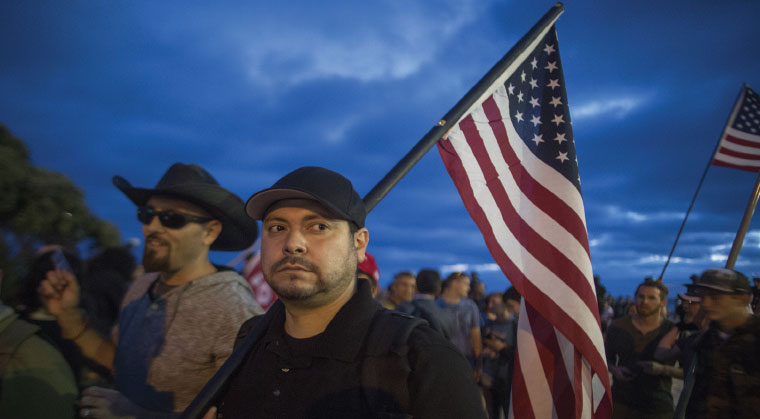Is There Really a Jewish Vote?


VOICE OF THE PEOPLE Since the 1920s American Jews have retained a strong preference for the Democrats in most presidential elections. Will 2016 be any different? (Photos: AFP/ImageBank)
N obody conducted exit polls when Abraham Lincoln was president but if they had been taken chances are high they would have shown most American Jews voted for the Republican from Illinois. Democrats could not rely on winning the Jewish vote until the mid-1920s when streams of new European Jewish immigrants steeped in socialist and liberal ideologies became the majority among Jewish registered voters.
Since then American Jews have retained a strong preference for the Democrats in most presidential elections. While 2016 should be no different Hillary Clinton is unlikely to receive the 78% of the Jewish vote that Barack Obama received in 2008 and may struggle to reach Obama’s second term level of 69%.
“There is still a sizable portion of the Jewish community that are really worried about where the Democratic Party is going and where it’s gone under Barack Obama” says Professor Gil Troy a visiting professor at the Ruderman Program for American Jewish Studies at the University of Haifa and author of a new research paper “The Jewish Vote: Political Power and Identity in US Elections ” which chronologically traces the historical voting patterns of American Jews and analyzes the complex factors that make up the Jewish vote.
No one party has ever “owned the Jewish vote” a phrase that first surfaced in 1864 in response to a report that Abe Lincoln who was running for re-election had struck a deal with New York Jewish leaders for their votes. A New York lawyer and community leader Myer Isaacs was alarmed and wrote Lincoln that “there is no Jewish vote” and “if there were it could not be bought.” “The Jews as a body have no politics ” Isaacs contended.
That concept of Jewish political neutrality notes Troy was championed by another Jewish attorney and leader of the American Jewish Committee Louis Marshall who was also a power player in Republican Party politics in every presidential campaign from 1896 through 1928. In Marshall’s worldview Jews were meant to be true Americans and behave like Americans especially in politics. He generally discouraged the formation of separate Jewish political clubs; thought that rabbis and lay leaders had no right to advise the community on how to vote; believed Jewish agencies should not use their influence to promote Jewish aspirants to political office; and argued that Jews should not support a candidate just because he happened to be Jewish. That neutrality ended long before today’s era of political polarization where everyone feels they have to take sides.
Professor Troy says one of the important takeaways from political efforts during the Holocaust era and the subsequent Jewish campaign in the 1970s and 1980s to free Soviet Jewry was that observing neutrality and staying above the fray doesn’t work. “We’re not in America on good behavior” Professor Troy says. “We have a right and an obligation to use our power as Jews to stand up when necessary.”
Activism aside that power manifests itself in two additional ways. At the ballot box and with check-writing.
Jews comprise about 2% of the US electorate and their voices can make a difference in certain swing states such as Florida or Ohio if an election turns out to be a squeaker.
And according to both the Washington Post and JTA in the 2016 presidential race Jewish donors have contributed some 50% of the funds raised to the Democratic Party and some 25% percent to the Republican Party.
Republicans have mega-donors like Sheldon Adelson and the Democrats have more than their share of high flyers including George Soros and Haim Saban. The fundraising advantage Democrats enjoy over Republicans among Jews is a reflection of how American- Jewish liberalism developed over the last 90 years.

Professor Gil Troy: “We’re not in America on good behavior. We have a right and an obligation to use our power as Jews to stand up when necessary”
“You have this irony where less affiliated Jews have come to view their liberalism as part of their Jewish identity” Professor Troy says. “The most liberal Jews put on their American hat and not a kippah when they’re voting. They have a depth of emotion to a pro-choice ideology and a depth of fear for both evangelicals and a rigid America that motivates them far more than their devotion to Israel or anything else.”
As far as Donald Trump is concerned much of the Jewish vote he will garner will be a vote against his opponent rather than a ringing endorsement for him.
“There’s this Jewish dance around Trump” Professor Troy says. “Trump has been able to tap into the true Jewish conservatives partially because their hate for Hillary is far greater than their fear of Trump.”
Oops! We could not locate your form.







